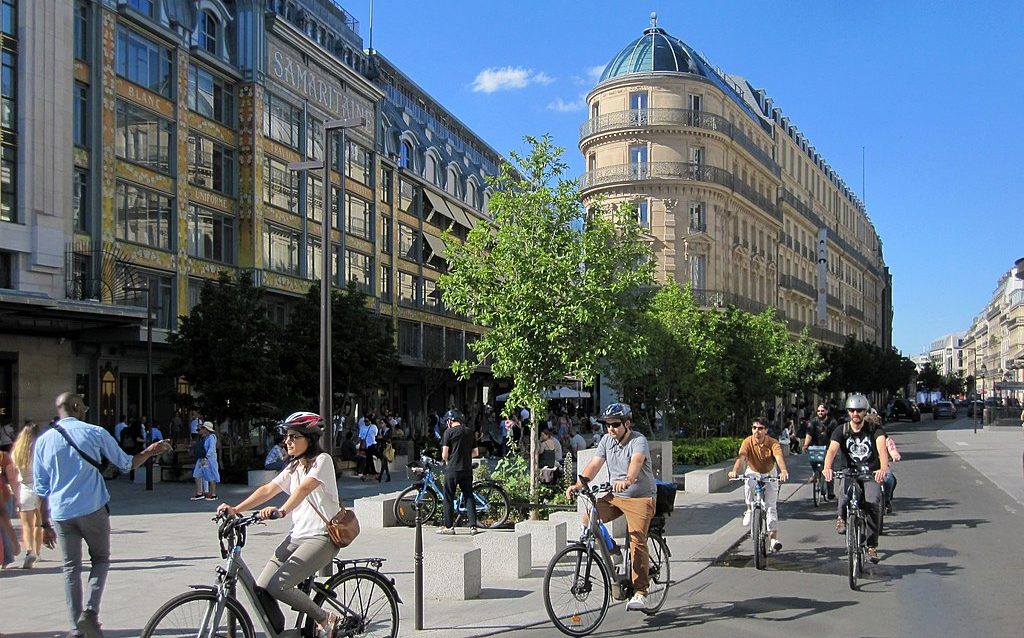- Fifteen-minute cities may not be feasible in North America, according to a McGill University study. Instead, jobs and services within a 30-minute reach is more feasible. And European backers of the 15-minute concept aren't necessarily doing themselves any favors winning over American skeptics (Governing).
- Replacing stroads with boulevards, combined with zoning reform and eliminating parking mandates, could solve the housing crisis, according to one prominent New Urbanist planner. (CNU Public Square)
- The most recent People for Bikes report argues that once cities reach a certain threshold for bike infrastructure, residents only want more. (Streetsblog USA)
- Vision Zero safety projects have no impact on businesses' finances, according to a University of Washington study.
- Norfolk Southern tried to hide information about the East Palestine train derailment from federal investigators, the head of the National Transportation Safety Board said. (Politico)
- When New York Gov. Kathy Hochul canceled congestion pricing, she may have cost New York City more than 100,000 jobs. (NY Times)
- A Philadelphia Inquirer timeline traces why Southeastern Pennsylvania transit has had such a hard time finding funding for so long.
- Even cities full of electric vehicle early adopters like Los Angeles have a dearth of chargers. (Axios)
- An announcement on whether Maryland's Red Line will be light rail or bus rapid transit is expected soon. (Baltimore Banner)
- There are a lot of angles to the debate over Atlanta Beltline transit, but one of them is whether the rails-to-trails project looping around the city is primarily for walking or transit, as originally envisioned. (Saporta Report)
- Bike Portland lays out local candidates' views on Vision Zero.
- Bus service is essential for the Winston-Salem economy. (Triad City Beat)
- Vancouver is allowing more housing density near public transit hubs. (Daily Hive)
- Electric vehicles wear out tires more quickly than gas-powered ones, and major tire manufactures don't seem interested in developing a product that puts out less particle pollution. So one Iceland entrepreneur is stepping into the gap. (The Verge)
- As a result of new European Union rules, all new cars sold in the UK must be retrofitted with speed limiters starting next month. (Birmingham Mail)
- While it may not always be feasible because different buses may need to be deployed on different routes, transit consultant Jarrett Walker likes the idea of painting valuable route information on bus exteriors. (Human Transit)
- Who are you, and what have you done with the Georgia DOT? (Flagpole)
Today's Headlines
Thursday’s Headlines Are Running 15 Minutes Late
15-minute city advocates have a lot of work to do to prove the idea will be feasible in the U.S., a pair of recent articles argue.

This is the future liberals want.
|DiscoA340Stay in touch
Sign up for our free newsletter
More from Streetsblog USA
Monday’s Headlines Took the Keys Away
A demographic disaster is coming as a generation of aging suburbanites become either dangerous drivers or trapped in their homes.
Why Anti-Trans Laws Are Terrible For Transportation, Too
A disturbing new Kansas law revokes trans people's driver's licenses. Here's how it will make our communities more dangerous.
Sunbelt Cities Rank Last in National Street Safety Index
Cars and drivers continue to dominate the newest and sunniest cities in the United States.
Americans Demand Congress Fund Active Transportation In Next Infrastructure Bill — And Not Just The Bike/Walk Advocates
A "back to basics" surface transportation bill — as Republicans are seeking — would be devastating for road safety and small businesses.
Friday’s Headlines Take a Lot to Laugh, Take a Train to Cry
I ride on a mail train, baby. Can't buy a thrill.
Talking Headways Podcast: The Future of Transit
Yonah Freemark talks with Jeff Wood about the state of the trains across the world.





